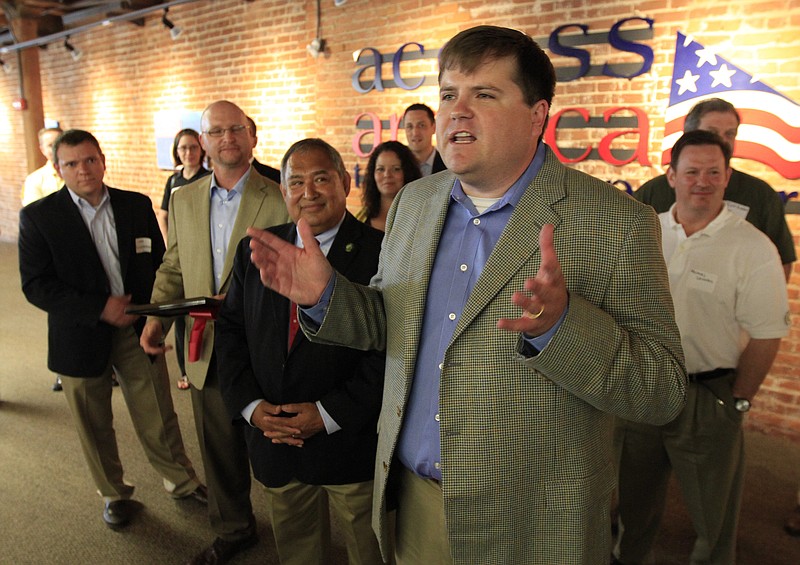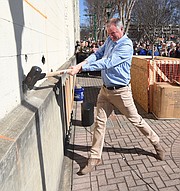At some point, as the businesses just kept proliferating, Ronald Ramsey and Chad Eichelberger started making a list.
Reliance Partners. Steam Logistics. Trident Transport. Taimen Transport. LYNC Logistics. Avenger Logistics. A dozen others, and all of them have one thing in common: one way or another, they can track a connection back to Access America Transport, founded 20 years ago in Chattanooga.
"We're proud of our legacy, and we're proud of the effect the company had in our town," says Ramsey, the chief commercial officer for Reliance Partners, which has grown from its start as an insurance business inside Access America to become the largest private agency in the U.S. dedicated to logistics.
"And this is just in Chattanooga," Ramsey adds. "We've got a very similar ripple effect in Birmingham and Minneapolis and other places."
Eichelberger, the president of Reliance, joined Access America just a year out of college in 2005. Ramsey followed in 2007, and Reliance Partners was born inside the business in 2009, led by Andrew Ladebauche, who is still the CEO of the insurer.
"We'll write over $650 million in written premium this year, and we started out with two customers: Access America and AAT Carriers," Ramsey says.
But the explosion of the local logistics industry in the last 20 years has roots that reach generations deeper than Access America. As far back as 1950, when modern-day logistics giant Kenco was born as a single warehouse on West 25th Street, the seeds of Chattanooga's future as Freight Alley had already been planted.
"If you look all the way back to when the early settlers from Europe arrived, the Native American population was using the opening in [Missionary] Ridge to trade," says Santosh Sankar, a co-founder and managing partner of Chattanooga-based Dynamo Ventures, a venture capital firm that invests primarily in logistics companies worldwide - and also traces its roots to Access America.
The expansion of railways into Chattanooga in the 1850s, the subsequent build-up of manufacturing, the expanding options for moving goods along the Tennessee River beginning in the 1930s, and the arrival of converging interstate highways through the 1960s and 1970s steadily expanded the foundation of Chattanooga's role as logistics hub, creating a major source of jobs and economic growth for the region.
"One of the reasons Volkswagen decided to base its North American manufacturing here is the proximity to rail," Sankar adds, calling surface transportation a "heritage industry" in Chattanooga going back centuries.
"We're seeing growth [in that industry] now with new companies such as Steam Logistics, FreightWaves and Bellhops, and those companies are standing on the shoulders of giants like Kenco, U.S. Xpress and Covenant [Logistics]," Sankar adds.
Ramsey can attest to the role of those earlier logistics pioneers; he began his own career at U.S. Xpress, where he was a customer service manager from 2004 to 2007.
A Long Road
Nathan Wooten runs two transport companies from his office in Trenton, Georgia, and grew up in logistics before it had that fancy name, he says. His father was a transport manager for Magic Chef and then for World Carpet in Dalton, Georgia.
"He got me hired into the business," Wooten says.
Wooten began his career as a college student in 1982 at Southwest Motor Freight, the company owned by Clyde Fuller that ultimately gave rise to Chattanooga-based trucking giants U.S. Xpress and Covenant Transport.
In 1987, after Clyde Fuller sold the Southwest Motor Freight business, Wooten went to work for carpet haulers in North Georgia before starting his own business in 2003. In that respect, he's like an awful lot of others in the industry, Wooten says.
Nearly every freight and logistics company in the region can trace its roots in one way or another back to that handful of early pioneers in the business, he says.
"U.S. Xpress and Covenant Transport – those guys evolved in the late '80s and have grown to what they are today, and there's a number of people who have worked for those companies, learned the business and then left those companies to start their own," Wooten says.
"If you dig down into these brokerages, you'll find old U.S. Xpress or Covenant people. If somebody created a family tree of trucking around Chattanooga, the name Fuller would be at the bottom of the tree."
In 2002, the new wave of logistics expertise arrived. Access America Transport spawned multiple companies, from Steam Logistics to Reliance Partners, in part because the culture of entrepreneurship across Access America encouraged employees to think like owners, Wooten says.
"Ted [Alling] did a really good job with his company when he started it and gave people a lot of knowledge," Wooten says. "Those three companies have former employees scattered all across the industry."
Alling, who co-founded Access America with friends Barry Large and Allan Davis, says the entrepreneurial culture he and his partners built was no accident.
"When we got going, there was U.S. Xpress and Covenant, there was KenCo and Tranco – which is quietly building a huge company – and as we grew here, we just had such an entrepreneurial mindset," Alling says. "All our employees felt like they were growing their own businesses."
Ramsey echoes that sentiment, saying the people who built Access America empowered employees to think and act as owners.
"It validates that the culture and everything we believe in and the pathway we gave our employees for success – it validates that," Ramsey says. "We did it the right way."
As the industry grows, and local logistics businesses continue to proliferate, the community benefits on multiple levels, Alling says.
"Everyone knows about this industry in our community now, and I have a lot of parents that are like 'My kids is in logistics now,' and that's such a beautiful thing as we try to retain talent here," Alling says. "We're creating a lot of neat headquarters based in Chattanooga that will create wealth for our community long term."
Local Logistics Milestones
1950
Jim Kennedy, Jr. and his brother-in-law Sam Smartt opened the first Kenco warehouse at 421 W. 25th St. in 1950. Today, Kennedy's daughter, Jane Kennedy Greene, is the company's chairwoman, and Kenco calls itself the largest woman-owned third-party logistics company in the U.S. Over the past 72 years, Kenco has grown into a logistics provider managing 90 distribution facilities comprising 30 million square feet of space, and serving over 200 clients with varying logistics needs across a wide range of industries. The business hit $1 billion in revenue in 2021, says Scott Mayfield, President of Kenco Management Services.
"For the past 20 years it's been a race for data, metrics and leading through technology," Mayfield says. "Our customers have so much information thrown at them – the products, the inventory – they want partners to provide real time data on the supply chain. You don't put the investment in those areas, you'll be left behind."
1986
Max Fuller and Pat Quinn, friends who had worked together at Southwest Motor Freight, founded U.S. Xpress. Max Fuller's father, Clyde Fuller, gave the men 25 trucks, and their original fleet of 48 has grown to more than 7,000 trucks and 19,000 trailers. U.S. Xpress is now one of the largest trucking companies in the country. The business became publicly traded in 2018, and has launched a new Atlanta-based trucking business, Variant, to build a technology-enabled fleet.
1986
David Parker, the stepson of Clyde Fuller, launched Covenant Transport with 25 trucks and 50 trailers. The business rebranded in 2021 to Covenant Logistics, and has diversified its trucking operations to focus more on freight logistics, warehousing and other inventory management. In addition to Covenant's three primary corporate facilities in Chattanooga, Greenville, South Carolina, and Nashville, the company has shops, terminals, office locations and 15 warehouse locations, all giving Covenant a footprint in 38 states across the country.
1995
Twin brothers Bruce Trantham and Byron Trantham founded Tranco Logistics as a warehouse operation with its first facility on 42nd Street in south Chattanooga with a single truck. Bruce Trantham continued working at UPS for the first few years of the business while it got started and both Bruce and Byron drove trucks, unloaded freight and ran forklifts even as more warehouses were added and the business grew. The Chattanooga-based company operates more than 2 million square feet of warehouse facilities and serves about 400 customers around the globe, and has grown to include 192 trucks and 542 trailers. The company has also added freight brokerage and other logistics support services over the years. To support operations, the Trantham brothers have also added both a staffing and a finance firm. The personnel placement company, MSI Workforce Solutions, helps recruit and place workers in a variety of companies, including Volkswagen of America.
2002
A trio of fraternity brothers from Samford University – Ted Alling, Allan Davis and Barry Large – launched Access America from a back room at Key-James Brick, a Chattanooga building-supply stalwart owned by Large's father. Alling had been working for third-party logistics behemoth C.H. Robinson Worldwide, and was ready to build something new.
2009
Reliance Partners was born inside Access America Transport. The business is now a standalone firm and the largest private agency in the U.S. dedicated to logistics. The business will write over $650 million in written premium this year.
2012
Steam Logistics launched inside Access America Transport. The business is now a standalone freight brokerage that handles both international and domestic freight. Steam has grown from 30 people five years ago to 600 and counting.
2014
Coyote Logistics bought Access America. The business had 800 employees and sales of $600 million, and Alling made a prediction: "We're going to create a lot of new headquarters here in Chattanooga."
2015
UPS bought Coyote Logistics for $1.8 billion.
2016
Large, Alling and Davis founded logistics venture capital firm the Dynamo Fund, seeking to grow the most promising companies in the logistics space.
READ MORE
* New road: U.S. Xpress harnesses technology to improve driver experience with Variant model

